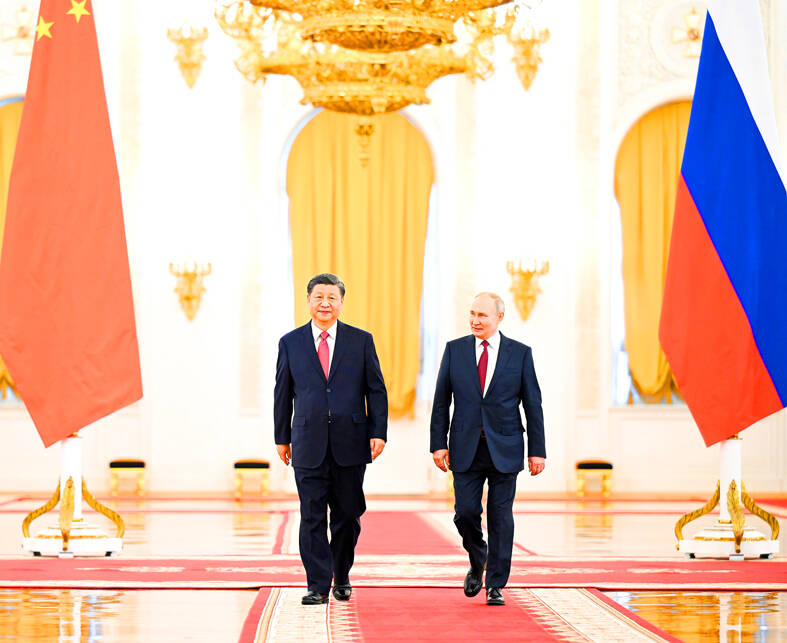The Ministry of Foreign Affairs (MOFA) yesterday condemned Beijing and Moscow for a joint statement that called Taiwan an “inalienable” part of China, accusing Russia of “dancing to China’s tune.”
Russian President Vladimir Putin hosted Chinese President Xi Jinping (習近平) for two days of talks this week, with the leaders signing a joint statement pledging to deepen their strategic partnership — and affirming Russia’s support for China on Taiwan.
The ministry “solemnly protests and strongly condemns [China’s] authoritarian expansionist government for continuing to issue false statements in the international arena to belittle and damage our country’s sovereignty,” it said in a statement.

Photo: EPA-EFE / Xinhua / Xie Huanchi
It also condemned “Russia’s attempt to sing and dance to China’s tune for its conspiracy of aggression and expansion.”
In the joint statement, Russia reaffirmed its adherence to Beijing’s “one China” principle, terming Taiwan “an inalienable part of Chinese territory,” Xinhua news agency reported.
Russia “opposes any form of ‘Taiwan independence,’ and firmly supports China’s measures to safeguard its sovereignty and territorial integrity,” Xinhua quoted the statement as saying.
Xi left Moscow yesterday after a summit with Putin that the two leaders hailed as a “new era” in their relationship, Russian news agencies reported.
The nations, eager to curb Western power, expressed concerns about NATO expansion in Asia, and agreed to deepen a partnership that has grown closer since Putin ordered the invasion of Ukraine.
Putin said he was open to talks on Ukraine and praised Beijing’s 12-point position paper on the conflict, which includes a call for dialogue and respect for all countries’ territorial sovereignty.
Ukrainian President Volodymyr Zelenskiy said Kyiv has invited China to talks, and is waiting for an answer from Beijing.
“We offered China to become a partner in the implementation of the peace formula. We passed over our formula across all channels. We invite you to dialogue. We are waiting for your answer,” Zelenskiy told a news conference.
However, the US said it does not see China as capable of being an impartial mediator.
“I don’t think you can reasonably look at China as impartial in any way,” US National Security Council spokesman John Kirby told reporters on Tuesday.
China has refrained from criticizing the Russian invasion of Ukraine and has continued to buy Russian oil even as the West piles sanctions on Moscow’s energy industry, Kirby said.
China also “keeps parroting the Russian propaganda,” saying that the US and other countries in the West are to blame for the war for giving such strong support to Ukraine over the years that Russia felt threatened and justified in invading, he added.
Kirby said the two were linked not so much by an alliance, but rather “a marriage of convenience, because that’s what I think it is.”
Separately, US Secretary of State Antony Blinken said Xi’s Moscow visit “suggests that China feels no responsibility to hold the president accountable for the atrocities committed in Ukraine.”
“And instead of even condemning, it would rather provide diplomatic cover for Russia to continue to commit those great crimes,” he added.

The Ministry of Foreign Affairs (MOFA) yesterday said it is closely monitoring developments in Venezuela, and would continue to cooperate with democratic allies and work together for regional and global security, stability, and prosperity. The remarks came after the US on Saturday launched a series of airstrikes in Venezuela and kidnapped Venezuelan President Nicolas Maduro, who was later flown to New York along with his wife. The pair face US charges related to drug trafficking and alleged cooperation with gangs designated as terrorist organizations. Maduro has denied the allegations. The ministry said that it is closely monitoring the political and economic situation

Conflict with Taiwan could leave China with “massive economic disruption, catastrophic military losses, significant social unrest, and devastating sanctions,” a US think tank said in a report released on Monday. The German Marshall Fund released a report titled If China Attacks Taiwan: The Consequences for China of “Minor Conflict” and “Major War” Scenarios. The report details the “massive” economic, military, social and international costs to China in the event of a minor conflict or major war with Taiwan, estimating that the Chinese People’s Liberation Army (PLA) could sustain losses of more than half of its active-duty ground forces, including 100,000 troops. Understanding Chinese

UNRELENTING: China attempted cyberattacks on Taiwan’s critical infrastructure 2.63 million times per day last year, up from 1.23 million in 2023, the NSB said China’s cyberarmy has long engaged in cyberattacks against Taiwan’s critical infrastructure, employing diverse and evolving tactics, the National Security Bureau (NSB) said yesterday, adding that cyberattacks on critical energy infrastructure last year increased 10-fold compared with the previous year. The NSB yesterday released a report titled Analysis on China’s Cyber Threats to Taiwan’s Critical Infrastructure in 2025, outlining the number of cyberattacks, major tactics and hacker groups. Taiwan’s national intelligence community identified a large number of cybersecurity incidents last year, the bureau said in a statement. China’s cyberarmy last year launched an average of 2.63 million intrusion attempts per day targeting Taiwan’s critical

‘SLICING METHOD’: In the event of a blockade, the China Coast Guard would intercept Taiwanese ships while its navy would seek to deter foreign intervention China’s military drills around Taiwan this week signaled potential strategies to cut the nation off from energy supplies and foreign military assistance, a US think tank report said. The Chinese People’s Liberation Army (PLA) conducted what it called “Justice Mission 2025” exercises from Monday to Tuesday in five maritime zones and airspace around Taiwan, calling them a warning to “Taiwanese independence” forces. In a report released on Wednesday, the Institute for the Study of War said the exercises effectively simulated blocking shipping routes to major port cities, including Kaohsiung, Keelung and Hualien. Taiwan would be highly vulnerable under such a blockade, because it